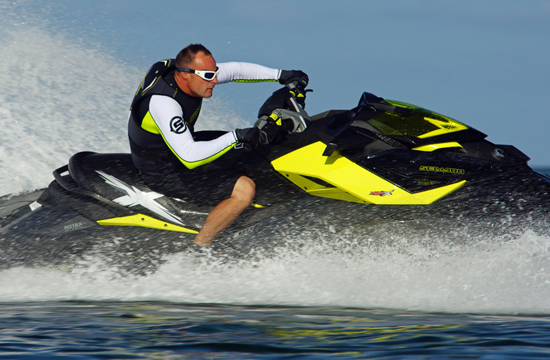One of the easiest and most fun ways to enjoy everything the water has to offer is on a personal watercraft. Personal watercrafts have taken great strides toward modernization; the PWCs of today are quiet, run on clean four-stroke technology engines, include significant safety features, are more stable, and are designed to accommodate up to three passengers. Because advances in technology have made personal watercraft options from brands like Sea-Doo, Jet Ski, Kawasaki and WaveRunner more accessible and easier to use, more people are enjoying them each year. PWCs are also incredibly versatile and are becoming popular for towing wake boarders, tubers, and water skiers, exploring waterways and fishing. They can even be used as transportation to and from overnight camp sites.

To fully enjoy a PWC, riders must be responsible, safe and educated about operating one. Before you insert the key into the ignition, here are a few questions to ask yourself:
* Are you of legal age in your state to operate a PWC?
* Do you know your craft and the specific ways it operates compared to other PWCs?
* Have you read all instructional materials and labels from the manufacturer?
* Do you know the “rules of the road” on the water?
* Are you wearing a personal flotation device (PFD) and neoprene shorts?
If you answer “no” to any of these questions, it’s time to head back to the dock.
Responsible riding isn’t just about personal safety. It also includes being considerate of those around you. Be mindful of other vessels in your vicinity and how your rate of speed or wake affects them. And don’t forget about marine life: Respect ecologically sensitive areas.
The Personal Watercraft Industry Association offers important safety tips, rider rules, local laws and PWC etiquette for riders of every skill level. Information on instructional courses and downloadable safety materials, including a brief handbook titled Riding Rules for Personal Watercraft and PWC Orientation Checklist can be found at www.pwia.org. Additional information can also be found through the United States Coast Guard. Getting educated about riding a PWC responsibly will ensure you’re equipped to handle the vessel and can enjoy a fun-filled day on the water.
Before you get your feet wet, remember to ride responsibly. Visit www.pwia.org to learn more about riding responsibly, or visit us on twitter @PWIA_News.

